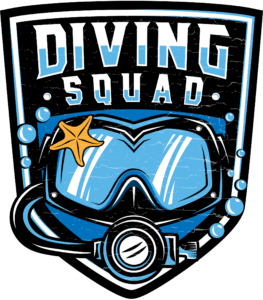Best Budget Dive Computer [2024]
(Taken from our main page on the best dive computers).
It’s no secret among scuba divers that a dive computer can be one of the most expensive pieces of scuba diving gear – but that needn’t be the case!
Not many dive centres or websites like to share this information, because they’d prefer to sell you the most expensive option but there’s actually plenty of cheap dive computers models that have been designed to function well yet not cost much.
This page reviews the 9 best budget dive computers trending the market in 2024; highlighting their pros, exposing their cons and comparing their stats.
We start with the cheapest dive computer of all time and present the rest in order of increasing price. Let’s dive in!
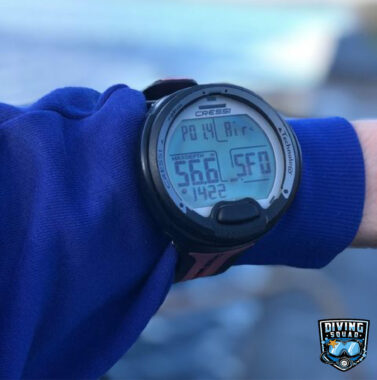
QUICK LOOK:
- Cheapest: Cressi Leonardo
- Second Cheapest: Aqua Lung i200
- Upgrade from Cheapest: Cressi Goa
- Top Seller: Suunto Zoop Novo
- Most Durable: Seac Action HR
- Most Compact: Genesis Centauri
- New release: Aqualung I300C
- Huge Battery: Mares Puck Pro
- Biggest Logbook: Deepblu Cosmiq
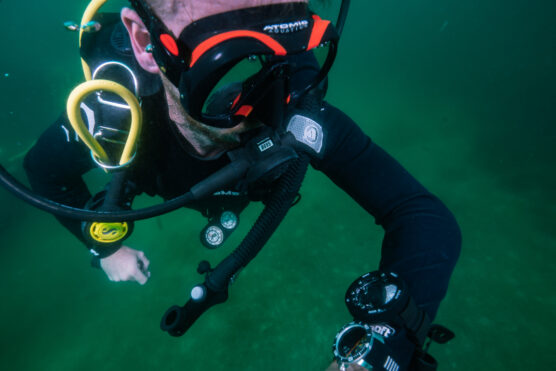
REVIEWS:
1) Cheapest Dive Computer: Cressi Leonardo
The Cressi Leonardo is the cheapest dive computer out there yet has all the standard functionalities with displays for depth, dive time, no decompression limit and temperature. It offers air, nitrox and gauge modes.
With a diameter of 67mm, it’s display is bigger than any other dive computer’s making it extra easy to read. Just realise that this means it is quite bulky on your wrist, being much larger than a standard watch and bigger than other dive computers to.
With a single button user interface it’s extremely simple to scroll through the settings – but not the fastest. However, you’ll rarely have to fiddle with settings on a dive.
The logbook is 70 hours, which is longer than that of most other dive computers. It comes in a variety of colours.

PROS:
- Cheapest dive computer
- Easy to read and use
- Variety of colour options
CONS:
- Settings navigation can be slow
- Quite bulky
2) Second Cheapest Dive Computer: Aqualung I200
The second cheapest dive computer is the Aqualung i200; it’s quite different to the Cressi Leonardo in that it’s much smaller and has four buttons instead of one for faster settings selection. In addition to air, nitrox and gauge mode there is also a free dive mode.
It does have a very small dive log of only 20 hours; smaller than that of virtually every other dive computer but at least you can easily download dive data to the app via bluetooth connection to free up the divelog.
With automatic activation upon immersion in water, a simple user interface and a user changeable battery, it is easy to use even for complete newbie divers.
This is one of the few dive computers where the whole thing – strap and case are available in different colours. Most other dive computer makes only offer different colours for the strap.
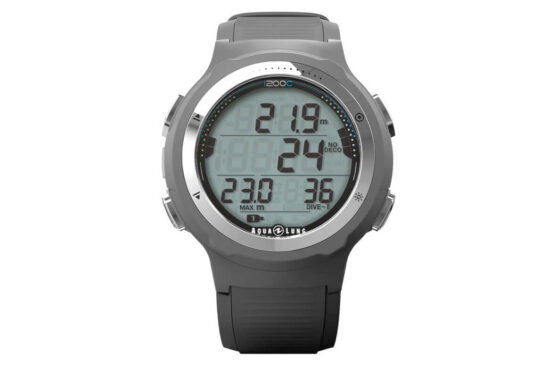
PROS:
- Compact size
- Bluetooth app
- Four buttons
- Case available in different colours
CONS:
- Very small dive log
3) Upgrade from Cheapest: Cressi Goa
Newer and a bit more expensive than the Cressi Leonardo, the Cressi Goa is similar to its predecessor in many ways; it has all the same functions however it is a lot more compact, has two buttons instead of one and also features free diving mode.
It also features a new CPU that is faster and with greater functionality plus a slightly longer lasting battery life.
This is the third cheapest dive computer; personally I feel the main advantage you get for the extra money is how much more compact it is – the Goa can be worn like a watch, which the Leonardo is too big for.
At forty hours long, the Goa’s dive log is pretty average for a dive computer – but not as long as the Leonardos’.
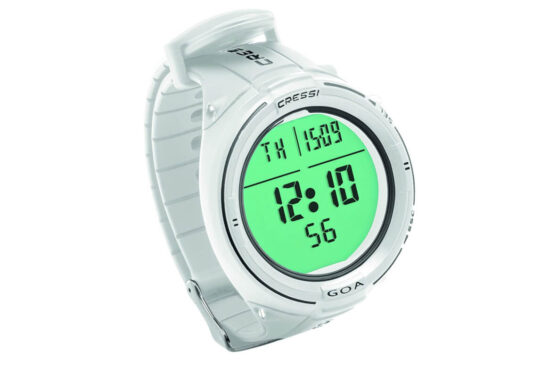
PROS:
- Third cheapest dive computer
- Easy and simple user interface with two buttons
- Extremely compact
CONS:
- Dive log is only average length
- Limited edition
4) Top Seller: Suunto Zoop Novo
The Suunto Zoop Novo was my first ever dive computer and is still my top recommendation for any new diver, thanks to it’s huge display, intuitive four button user interface and extra conservative dive profile algorithm.
It features five dive modes: air, nitrox, gauge, free dive, and off. There are also three different modes for how conservative you would like your dive profile to be, in case you have any pre-existing medical conditions.
The dive plan mode is excellent for instructors to illustrate dive planning during lessons on how to use a dive computer.
With it’s 56mm diameter display, the Suunto Zoop Novo is the second biggest dive computer. For me, it is the perfect size – big enough to see easily see but not quite as whoppingly huge as the Cressi Leonardo.
It also has the second longest dive log of any cheap dive computer at an impressive 140 hours long.
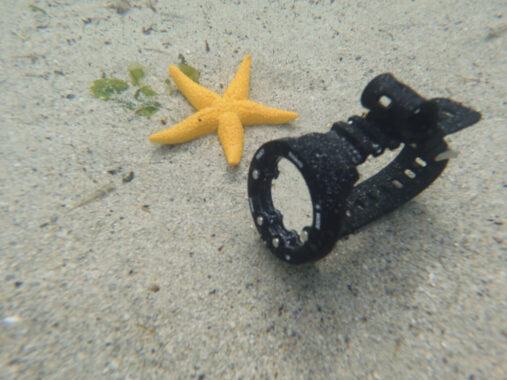
PROS:
- Large display makes it easy to read data
- Huge dive log
- Easy, four button user interface
- Fourth cheapest dive computer
CONS:
- A little bulky
- Strap is very long – better you cut it
5) Most Durable: Seac Action HR
The Seac Action HR is a newly released dive computer with the following modes: air, nitrox, gauge and freediving.
It is operated via four well spaced buttons and with a display diameter of 38mm is one of the more compact budget dive computers available.
It has a logbook memory of 40 hours, which is fairly average – bigger than some and smaller than others.
However, where the Seac Action HR really excels is durability: the HR stands for high resistance because this dive computer is highly resistant to blows, scratches and corrosion as well as temperature swings.
You can also adjust the brightness of its backlight in order to read it in low light conditions.
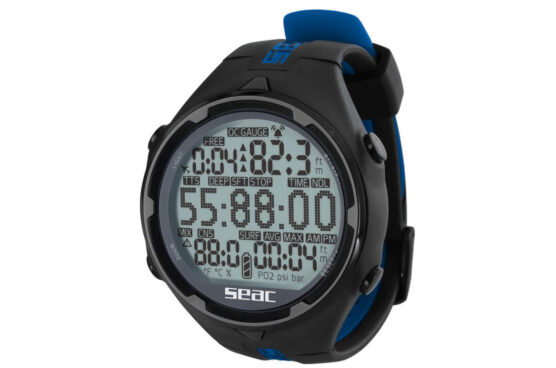
PROS:
- Highly durable
- Can adjust intensity of backlighting
- Compact
- Fifth cheapest dive computer
CONS:
- Seac are not the most well known scuba diving brand
6) Most Compact: Genesis Centauri
Whereas most cheap dive computers are quite large, there do exist a few options that are small enough to be worn as a regular watch. Of these, the Genesis Centauri is the very smallest, having a display diameter of just 27mm and a case diameter of 36mm.
It has four buttons and is unique in that rather than having two on each side, it has three on the right hand side and one on the left side.
It features a backlight, air and nitrox modes, a rechargeable battery and a dive app which you can connect to via bluetooth.
However, the app doesn’t currently have the option to export dive logs meaning there is no reasonable way to get your dive log app of the dive story app.
Despite this, the Genesis Centauri is a well praised and popular dive computer with users praising it’s reliability and extremely sleek, compact design.
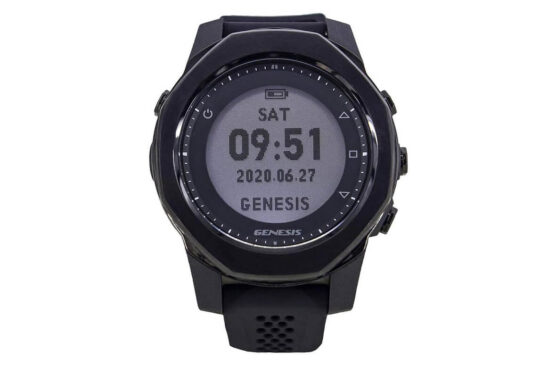
PROS:
- Most compact budget dive computer
- Unique button placement will appeal to some
- Rechargeable battery
CONS:
- Cannot export dive data from app
7) New Release: Aqua Lung I300C
Being one of the most newly released cheap dive computers, the Aqualung i300 has all of the standard functions a diver needs.: audible alarms, no decompression stop, air / nitrox mode, free dive mode and gauge mode.
A useful feature not found in many other dive computers, is the fact that it also retains data when you swap out the battery.
You can wirelessly interact with you i300 using the latest bluetooth technology using your smartphone device and the free Diverlog+ app.
It has a chic, modern design and is surprisingly large; more so than the Aqualung I200 as it has a display diameter of 43mm.
It has been designed with a beginner diver in mind; the screen is easy to read, even more so with the powerful backlight and the single button user interface is extremely simple to operate.
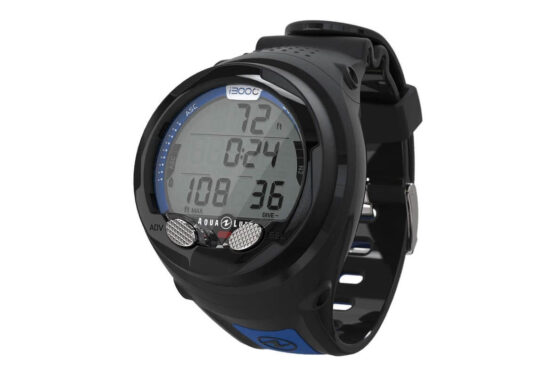
PROS:
- Backlight for easy reading in low light
- Automatic altitude adjustment
- Easy-to-use interface
CONS:
- Only one button makes settings a little slow to scroll through
- Quite bulky
8) Huge Battery Life: Mares Puck Pro
The Mares Puck Pro Plus has a whopping battery life of 400 hours long! On top of this, the battery is also user-replaceable so there’s hassle or postage fees of having to send it off to a service centre once it does finally run flat.
It allows air, nitrox and gauge mode like all dive computers but also fresh water calibration precautionary programming, residual nitrogen memory reset and multi-gas capability.
The screen is slimmed down for a sleek aesthetic yet is still easy to read, especially so thanks to the labels around the edges which makes viewing the displayed information very easy. It’s operated via one highly durable metal button.
You can upload your dive log directly onto your smartphone with bluetooth connectivity as soon as the dive is over. Software on the watch can be updated as Mares releases newer versions.
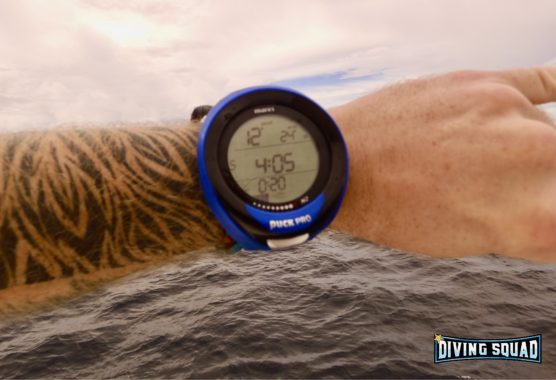
PROS:
- Huge battery life – 400 hours
- Many advanced features
- Medium size, not too big or small
- Bluetooth connectivity
CONS:
- Dive log of just 35 hours
- No free dive mode
9) Biggest Logbook: Deepblu Cosmiq
Stylish and modern, the Deepblue Cosmiq dive computer looks a lot more expensive than it really is. I love the bright, high contrast 2.2 inch display, which is extremely easy to read even in complete darkness.
Whereas most dive computers safety stop and rapid ascent alarms are only audible, the Deepblu Cosmiq also features flashing and buzzing alarms.
There’s three dive modes: scuba (air or nitrox), bottom timer and free dive. It is operated via two buttons with an extremely easy and simple user interface.
Unlike other dive computers, you don’t need to replace it’s battery – instead you can charge it with a USB magnetic charging device – it carries a battery life of 7 – 12 hours of diving time.
It also has the longest dive logbook of any dive computer at an insane 160 hours storage space!
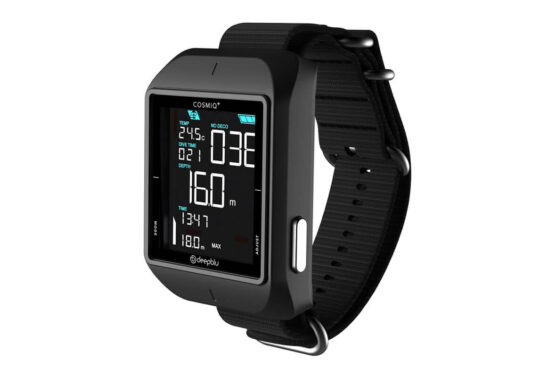
PROS:
- Easiest to read crystal clear display
- Biggest logbook of any dive computer
- No need to change battery – comes with USB charger
- Alarm includes buzzer and LED’s lights in addition to sounds
CONS:
- No freedive mode or off mode
Best Budget Dive Computers STATS COMPARISON:
| Display Diameter | Case Diameter | Buttons | LogBook | |
|---|---|---|---|---|
| CHEAPEST: Cressi Leonardo | 67mm | 90mm | 1 | 70 hours |
| SECOND CHEAPEST: Aqualung i200 | 40mm | 50mm | 4 | 20 hours |
| UPGRADE FROM CHEAPEST: Cressi Goa | 35mm | 48mm | 2 | 40 hours |
| BEGINNERS' CHOICE: Suunto Zoop Novo | 56mm | 66mm | 4 | 140 hours |
| MOST DURABLE: Seac Action HR | 38mm | 46mm | 4 | 40 hours |
| MOST COMPACT: Genesis Centauri | 27mm | 36mm | 4 | 40 hours |
| NEW RELEASE: Aqualung I300C | 43mm | 58mm | 2 | 20 hours |
| ADVANCED DIVING: Mares Puck Pro | 48mm | 60mm | 1 | 35 hours |
| BIGGEST LOGBOOK: Deepblu Cosmiq | 46mm | 70mm | 2 | 160 hours |
Why are these Dive Computers so Cheap?!
Cheaper prices often make shoppers feel like the product may be inferior in some way.
This is not the case with the dive computers listed above. However, there are some factors that may be lacking or not available because of the price point.
These factors do not affect the functionality and reliability of the watch but may be worth considering if you’re interested in tech diving. Or if you’re concerned about how you look.

Reasons for low price:
1) Look And Style
While hockey puck-sized computer screens make numbers easier to read underwater, they’re not the coolest looking things in the world. Budget dive computers are often lacking in that sleek, 21st-century look.
You could say they look more like the kind of wrist piece you’d see worn by Austin Powers rather than the Bondesque style dive watches that are available when you start spending a lot more money.
HD colored screens, changeable watch straps for out of water wearing, and chrome finishes are all details reserved for top-range dive computers.
However, scuba diving is an incredibly cool sport – don your ninja like scuba mask and wetsuit, your batman like weight belt and you’ll still look more dope than any mere beach bum, regardless of how big or small your dive computer is.
2) Additional Features
The basics are all there but features for more advanced diving are lacking. Air integration and digital compasses are the two features that stand out as missing. Tech diving is exactly as its name suggests – highly technical.
The needs of these divers can’t be met by the basic functions and features of entry-level computers. In my opinion, this is the real reason to be tempted to buy a more expensive and sophisticated dive computer. However, most people reading this won’t be a tech diver.
Hint: If you don’t know whether your a tech diver, you’re not! Recreational diving does not fall under the tech diving category.
Diving Squad Debriefing
Diving can cost a fair amount, and as someone who really does believe the best things in life are free, this can sometimes be a bit of a downer.
However, this list of the latest budget dive computer reviews can help keep costs low so that you can experience all the magic that our oceans have to offer.
Anything that means more time exploring underwater and less time worrying about cash gets a massive diver’s OK sign from me.
Related Reads:
Support the Squad!
We are part of the Amazon Services LLC Associate Program. If you make a purchase on amazon after clicking a link on Diving Squad, we earn a small commission fee, at no extra cost to yourself.
We are also part of several other affiliate programs so if you click on a Diving Squad affiliate link that results in you booking a liveaboard, booking accommodation, purchasing insurance or buying a product somewhere else, once more we make a small commission, without it costing you a cent extra. Thanks!
Written by:
Alex
